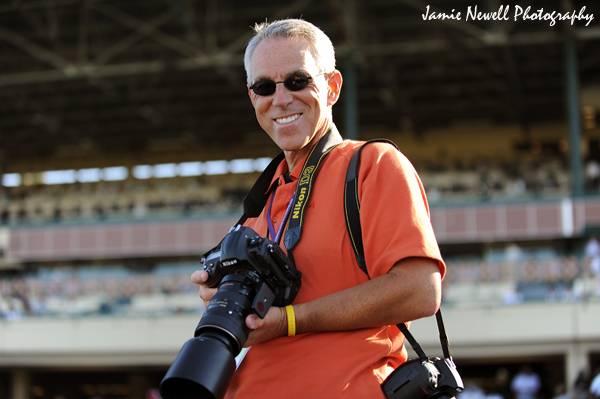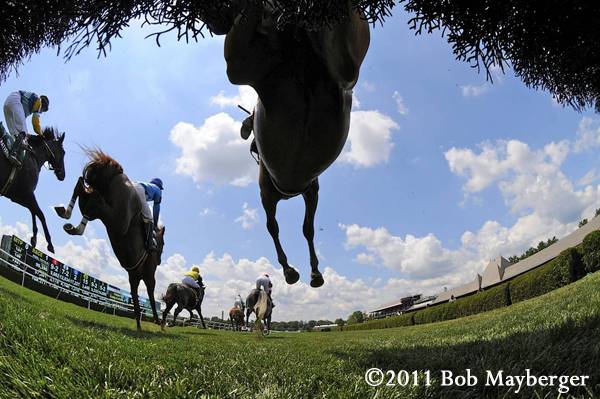Let me tell you a secret about horse racing photographers: Not all of them even like horse racing. Pretty sad, isn’t it, as they are given some of the most intimate, up-close access to our great sport? These are the people who don’t know the names of the horses, don’t follow the race results, and don’t know the difference between an outrider’s pony and Zenyatta.
 Then there is the other side of the coin. There are racing photographers out there who love the sport so much, they will travel across the globe to take thousands of breathtaking photos that most people will never see. They follow individual horses for the sheer love of the sport. (And the fact they are positively, one hundred percent, certifiably addicted to shooting the races.) They’re called crazy by some people—by those who just don’t understand.
Then there is the other side of the coin. There are racing photographers out there who love the sport so much, they will travel across the globe to take thousands of breathtaking photos that most people will never see. They follow individual horses for the sheer love of the sport. (And the fact they are positively, one hundred percent, certifiably addicted to shooting the races.) They’re called crazy by some people—by those who just don’t understand.
I will have been professionally photographing Thoroughbred racing for only three years this June, but I have met nearly all of the best racing photographers in that amount of time, because there are so few of us. It only takes about a single minute to figure out the motivation behind each of them. When I came upon the horse paparazzi at Belmont Park for my first time as a credentialed photographer, I had no clue I was about to meet people just as whacked out of their minds about racing as I was. I met every mindset of photographers—but in those so-called “crazies,” I found my people.
Of course, we were all there for the Belmont Stakes, so all the best were in town, including this guy who sort of did his own thing and stayed off the monkeybars with the rest of us, Bob Mayberger. I found out fast he was a good photographer to follow, because not only did he know the track, he liked to take photos of every single aspect of the race—the walk over, the paddock fauna, the post parade, everything—just like me. Of course, I’d never done this before, so I was a racing maniac on top of a tourist. I’ve kind of maintained that, as have the best of the devoted. We just can’t let a moment slip by, because anything can happen at any given moment. A horse might sneeze, for instance. (Only kidding. Kind of.)
It also helped that Bob was one of the nicest photographers I’d had the chance to meet, and as I came to find out, not all of them are like that. It was a rainy day at Belmont the first two days I went out with credentials, and he was one of the only photographers slopping around in the muck and mire with me. When the rain really started to come down, he leant me his spare lens jacket so my equipment wouldn’t get soaked. I found out later his claim to fame was the shot of Big Brown’s bent horseshoe in the 2008 Belmont Stakes—the only person who seemed to have gotten this photo (or at least culled through his pictures enough to realize it). It quickly became apparent Bob was one of the good guys, someone who loved to capture the beauty of the sport and actually cared about the horses themselves. He wasn’t going to be one of those people who got a thrill out of snapping a shot of a horse breaking down. (Sadly, those photographers exist, too.) At Belmont, the other photographers even had a nickname for him—the Mighty Mayberger.
I met him again the next month, in a very unexpected place—Hollywood Park. This is when I began to realize that Bob was just as “crazy” as I was. We were both in town for the night races prior to Hollywood Gold Cup Day, and it was the first time to that track for both of us. We found it to be a photographer’s paradise, in disbelief some people referred to it as “the Aqueduct of the West.” Just another example of his appreciation for the beauty in racing others fail to see. That was the weekend I really got to know Bob, and nearly shook him off a crate in my excitement over Rail Trip winning the Gold Cup. (We fashioned a makeshift photographer’s stand out of a bucket and a dilapidated crate we found in the infield, and had to push them together to hold each other’s balance to shoot the race from the inside.) Due to our equal enthusiasm for racing, I ended up shooting with him at several other tracks; he became more than just a friendly face on my side of the rail, he became a friend.
Of course, this was during the glory days of Rachel and Zenyatta; it was a gift to be a fan during this period, and our luck we were able to shoot these living legends during their prime. When I was heartbroken I couldn’t be there in person to see Rachel run, Bob picked me up Rachel swag and mailed it to me. He understood what it meant to be a fan. When I got pictures of Zenyatta and found Bob lurking in the background, he was the first to see them.
Over the following years, I became aware of how unique Bob was and why he so rightly deserved the “Mighty” moniker. He is the only photographer I have ever met that travels the world to shoot horse racing on a regular basis. He shot 637 stakes races over the past three years, 207 grade or group Is. Outside of California and two at Keeneland, he has shot every major grade I race in North America. He has a passion to shoot at every racetrack he possibly can, from Golden Gate Fields to Royal Ascot. He doesn’t do this because it’s a good business move—Bob globetrots for the love of the sport. The horse paparazzi could not ask for a better spokesman, and that’s why his win in the 2011 Eclipse Award for Photography is such a big deal. Nobody else puts forward the kind of dedication and effort he does, always looking to capture a new perspective and show off the best sides our sport has to offer. So many times, the Eclipse has gone to a photo that highlights the tragic side of racing, or doesn’t offer up anything we haven’t already seen before. Frankie Dettori always performs his flying dismount after a stakes victory—how many times are we going to award this famous shot an Eclipse Award?
 How ironic it is that Bob, world-beating extraordinaire, should win the Eclipse for a photo he took at Saratoga, which is practically in his own backyard. This goes to prove how he is always looking for a fresh perspective, no matter how many times he’s shot at a racetrack; the photo itself, of a montage of horses leaping over a jump like they were picked out of a dream, is a perfect example of what makes his photography so special—his appreciation for the majesty in the Sport of Kings.
How ironic it is that Bob, world-beating extraordinaire, should win the Eclipse for a photo he took at Saratoga, which is practically in his own backyard. This goes to prove how he is always looking for a fresh perspective, no matter how many times he’s shot at a racetrack; the photo itself, of a montage of horses leaping over a jump like they were picked out of a dream, is a perfect example of what makes his photography so special—his appreciation for the majesty in the Sport of Kings.
It’s a shame people don’t see more of what Bob photographs, but that’s the way the industry is. He doesn’t really hear much feedback about his pictures, because he’s not connected to social networks, and he doesn’t have the time to post his photos to Flickr or a blog; when I tell him I saw one of his photos on a website, he usually acts surprised. As a photographer myself, I can tell you how any feedback at all makes a big difference, and this award is the ultimate reward for someone so deserving.
Chalk one up for the good guys. Congratulations, Mighty Mayberger.








